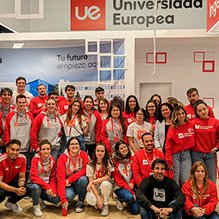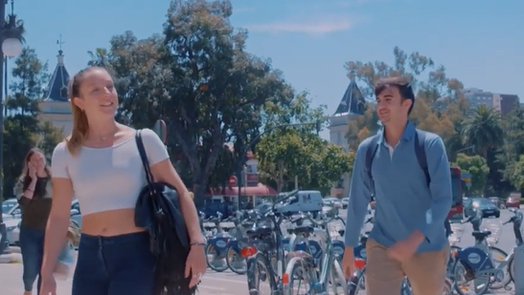-50% Discount on place reservation for 26/27 intake until Frebruary 28th!
Bachelor's in Translation and Intercultural Communication
The Degree in Translation and Intercultural Communication at Universidad Europea in Valencia is a four-year programme aimed at equipping students with the skills and knowledge to launch successful careers in the translation sector, including as legal translators, conference interpreters, project management, or language teaching.
The translation degree has a focus on experiential learning, and throughout your degree, which comprises 240 ECTS, you will have numerous opportunities to complete internships and work placements and leading companies in the sector, gaining real-time translation and interpreting experience. In addition, you will have at your disposal some of the best facilities available, including state-of-the-art translation booths.
Official degree issued by Universidad Europea de Valencia
| Campus-based | Classes in Bilingual-ES/EN | Valencia | 4 years, 240 ECTS | Start: 14 sep. 2026 | School of Social Sciences and Communication |
91%
Our students find employment in less than 12 months.
55%
You'll live in a diverse environment that is more multicultural than that of other universities.
3.600
UEV has a multitude of educational cooperation agreements with other centres.
Take a glimpse into your UEV experience
Study at an urban innovation campus in the heart of Valencia, with 10,000 m2 of facilities surrounded by green spaces.
Put theory into practice at our dental clinic, patient wards, the criminalistics lab or the translation booths.

Mobility offer
International mobility is one of the most valuable academic and life experiences we recommend during your university years.
We have agreements with many universities across different continents, so you can choose the one that best fits your academic goals.
Syllabus
Study plan structure*
*This degree covers the curricular itinerary of Law 10/2022, of September 6, on the comprehensive guarantee of sexual freedom.
Programa de estudios
PRIMER CURSO
| Materia | ECTS | Tipo | Idioma de impartición |
|---|---|---|---|
| Language and Culture A | 6 | CORE | Spanish (es) |
| Language B | 6 | CORE | Spanish (es)English (en) |
| Language C French | 12 | CORE | French (fr) |
| Language C German | 12 | CORE | German (de) |
| Comprehension and Production in Language A | 6 | CORE | Spanish (es) |
| Language B2 | 6 | CORE | Spanish (es)English (en) |
| Language C2 French | 6 | CORE | French (fr) |
| Language C2 German | 6 | CORE | German (de) |
| Professional Intercultural Communication | 6 | CORE | Spanish (es)English (en) |
| Initiation to Translation | 6 | CORE | Spanish (es)English (en) |
| Intercultural Analysis of Current Affairs Language B | 6 | CORE | English (en) |
SEGUNDO CURSO
| Materia | ECTS | Tipo | Idioma de impartición |
|---|---|---|---|
| Socio-Cultural Perspectives Language C (French) | 6 | COMPULSORY | French (fr)Spanish (es) |
| Socio-Cultural Perspectives Language C (German) | 6 | COMPULSORY | German (de)Spanish (es) |
| Language B3 | 6 | COMPULSORY | Spanish (es)English (en) |
| Language C4 French | 6 | COMPULSORY | French (fr) |
| Language C4 German | 6 | COMPULSORY | German (de) |
| Direct Translation I Language B | 6 | COMPULSORY | Spanish (es)English (en) |
| Language C3 French | 12 | COMPULSORY | French (fr) |
| Language C3 German | 12 | COMPULSORY | German (de) |
| Inverse Translation I - Language B | 6 | COMPULSORY | Spanish (es)English (en) |
| Computer-Assisted Translation | 6 | COMPULSORY | Spanish (es)English (en) |
| Direct Translation II Language B | 6 | COMPULSORY | Spanish (es)English (en) |
| Direct Translation I - Language C (French - Spanish) | 6 | COMPULSORY | French (fr)Spanish (es) |
| Direct Translation I - Language C (German - Spanish) | 6 | COMPULSORY | German (de)Spanish (es) |
TERCER CURSO
| Materia | ECTS | Tipo | Idioma de impartición |
|---|---|---|---|
| Terminology Management | 6 | COMPULSORY | Spanish (es)English (en) |
| Consecutive and Liaison Interpreting | 6 | COMPULSORY | Spanish (es)English (en) |
| Direct Translation II - Language C (French - Spanish) | 6 | COMPULSORY | French (fr)Spanish (es) |
| Direct Translation II - Language C (German - Spanish) | 6 | COMPULSORY | German (de)Spanish (es) |
| Inverse Translation II - Language B | 6 | COMPULSORY | English (en)Spanish (es) |
| Inverse Translation - Language C (Spanish - French) | 6 | COMPULSORY | Spanish (es)French (fr) |
| Inverse Translation - Language C (Spanish - German) | 6 | COMPULSORY | German (de)Spanish (es) |
| Specialised Translation - Language B | 6 | COMPULSORY | Spanish (es)English (en) |
| Digital Environment Translation | 6 | COMPULSORY | Spanish (es)English (en) |
| Economic and Legal Translation - Language B | 6 | COMPULSORY | Spanish (es)English (en) |
CUARTO CURSO
| Materia | ECTS | Tipo | Idioma de impartición |
|---|---|---|---|
| External Internships | 6 | EXTERNAL INTERNSHIPS | Spanish (es) |
| Simultaneous Interpreting | 6 | COMPULSORY | Spanish (es)English (en) |
| Dubbing and Subtitling | 6 | COMPULSORY | Spanish (es)English (en) |
| Business Ethics and Management of Translation Services | 6 | COMPULSORY | Spanish (es)English (en) |
| Advanced Translation Laboratory and Software Localisation | 6 | COMPULSORY | Spanish (es)English (en) |
| Final Degree Project | 12 | FINAL DEGREE PROJECT | Spanish (es)English (en) |
ELECTIVE SUBJECT (3rd and 4th years)
| Materia | ECTS | Tipo | Idioma de impartición |
|---|---|---|---|
| Advanced Simultaneous Interpreting | 6 | ELECTIVE | Spanish (es)English (en) |
| Professional Editing | 6 | ELECTIVE | Spanish (es) |
| Cultural Mediation | 6 | ELECTIVE | Spanish (es) |
| Advanced Consecutive and Liaison Interpreting | 6 | ELECTIVE | Spanish (es)English (en) |
| Sworn Translation | 6 | ELECTIVE | Spanish (es)English (en) |
| Didactics of L2 | 6 | ELECTIVE | English (en) |
| Introduction to Spanish Sign Language | 6 | ELECTIVE | Spanish (es) |
| University Training Activities | 6 | ELECTIVE | Español (es) |
| Introduction to Interpreting in Language C French | 6 | ELECTIVE | French (fr)Spanish (es) |
| Introduction to Interpreting in Language C German | 6 | ELECTIVE | German (de)Spanish (es) |
ELECTIVE SUBJECTS FOR THE MAJOR IN INTERPRETATION
| Materia | ECTS | Tipo | Idioma de impartición |
|---|---|---|---|
| Advanced Simultaneous Interpreting | 6 | ELECTIVE | Spanish (es)English (en) |
| Cultural Mediation | 6 | ELECTIVE | Spanish (es) |
| Advanced Consecutive and Liaison Interpreting | 6 | ELECTIVE | Spanish (es)English (en) |
| Sworn Translation | 6 | ELECTIVE | Spanish (es)English (en) |
| Introduction to Interpreting in Language C French | 6 | ELECTIVE | French (fr)Spanish (es) |
| Introduction to Interpreting in Language C German | 6 | ELECTIVE | German (de)Spanish (es) |
Programme implementation year
2013-2014
Places for incoming students
35
Graduation Profile
With the Bachelor's Degree in Translation you will acquire the skills that will allow you to work in many sectors: communicative competence in three languages, extra-linguistic or cultural knowledge, the necessary interpreting and translation strategies and techniques, and the technological and professional skills related to the exercise of the profession. The profile of the translator or interpreter is a global, technological, versatile, ethically, socially and environmentally committed, competent, analytical and innovative person.
Internships
Internships are a key element in your training. Gaining experience beyond what you have learned in your degree is the best way to enter the job market. There are two types of internships, curricular (included in your curriculum) and extracurricular (which you can do on a voluntary basis). In order to do a curricular internship, the student must be enrolled in the corresponding subject of the syllabus, which, if applicable, will specify the minimum credits that the student must have previously passed, as a necessary condition to do the internship. These internships are monitored by the company and the internship professor, as well as the completion of final reports for evaluation. If you want to improve your work experience before finishing your university education, you can do extracurricular internships. You can do them in any course, but we remind you that internships are a training complement to your studies; therefore, the more knowledge you have acquired throughout your studies, the more you will benefit from the internship experience. Consult the regulations here.
With the Degree in Translation and Intercultural Communication you will be trained as a professional translator and interpreter, and you will learn about the different job opportunities offered by this career. Internships are a very important part of your training. At present, we have the following specific participation agreements for the Degree in Translation and Intercultural Communication that guarantee the correct development of the internships described in the syllabus.
Firms/Institutions:
- 1Global Translators
- AC Estudis*
- Academia Yellow Fun And English
- Aesco Valencia
- Aguaclara Libros S.L.
- Air Nostrum
- Alos Soluciones Lingüísticas_Centro Europeo de Idiomas
- Aptent Soluciones S.L.
- Assistatour SL
- Ayuntamiento La Unión
- Babalu Studios
- Big Translation Agency, S.L. - Nine New Investments
- Centre Idiomes de la Universitat Valencia
- Centro Cultural Español De Turín
- Cillero&Demotta
- Cineuropa
- Colegio Leonardo Da Vinci
- Colegio Salesianos San Antonio Abad
- Colegio Santo Tomás de Villanueva-Agustinos
- Com. Y RRPP Babilia S.L.
- Condé Nast España.
- Cosmopolita Scotland
- Deneu. Asociación Enfermedades de los Neurotransmisores
- Endolinfa Producciones
- Eugenia Arres López - Earres
- Flycase Media*
- Fulgencio Pimentel
- Fundacion INCLIVA
- Fundación Plan Internacional España
- Fundación Politécnica de la CV
- Hispania, Educación Y Comunicación, S.L.
- Interpunct Translations, S.L.
- Jarit Asociación Civil
- Lambda
- Language Wire
- MANOS UNIDAS Delegación de Valencia
- Mas Traducciones*
- Max Traducciones
- Mondolirondo
- Nagareboshi, Sociedad Limitada*
- Nine New Investmetns (Big Translation)
- Palau de les Arts Reina Sofía, Fundació de la Generalitat Valenciana
- Pangeanic
- Prisma Media Proyectos, S.L.*
- Refuerzo Escolar Gallent
- Roche Diagnostics S.L.
- Rolf C.Hagen España
- Route 59
- SD Correcaminos
- Social Noise
- Solid Sound Studio*
- Subtitula'm S.L.*
- Taketombo Books
- Totart-Escuela Artes Escénicas
- Training Experience S.L.
- Transocean Transits - Tot Spain
- Transperfect Estudios, S.L.
- University World Sl
- Viajes Dpm S.L.
- Viajes Turisdenia S.L
- Welocalize Life Sciences S.L.
- White Paper Media
- Yuhu Learns - Yuhu Corp S.L.
Internationality
Internationality is part of the educational model of the Universidad Europea de Valencia in accordance with the philosophy of the European Higher Education Area and in line with the demands of today's society, which has undergone important changes due to globalization and internationalization. These two phenomena demand from any future university graduate the ability to work in multicultural environments, as well as to respect and adapt to social conventions inherent to other cultures. This is why an international stay is considered fundamental, since this experience provides them with greater autonomy and maturity when dealing with new environments. It also develops their critical capacity by making them able to establish comparisons between different social systems, as well as multiculturalism and tolerance. The international experience helps the student to weave an international social network, providing greater possibilities for professional development and improving their communication skills in foreign languages.
In the specific case of the TCI Degree, the international stay is clearly a formative need for the student, which is recommended to be carried out preferably in the fifth, sixth, seventh and/or eighth semesters, and which will clearly contribute to the effective achievement of the set of established formative objectives. In recent years, an average of 40% of students take the opportunity to complete an international stay, mainly in European destinations..
The Universidad Europea de Valencia has signed more than 200 exchange agreements, both within the Erasmus+ network and with universities located in the 5 continents.
What to do with a Bachelor Degree in Translation?
Translators are in increasing demand as a result of globalisation and heightened interactions between companies around the world. With the Bachelor's in Translation, you can choose to develop a global profile or specialise in a particular sector.
Professional opportunities
- Specialized translation (legal, scientific-technical, tourism...)
- Audiovisual translator (dubbing, subtitling, audiodescription, subtitles for hearing impaired)
- Literary translation
- Localization of video games, websites and software
- Conference interpreting (consecutive, simultaneous, whispered interpreting...)
- Interpreting in public services
- Project management
- Proofreading/editing
- Computational linguistics
- Terminology
- Language consultancy
- Language teaching
- University teaching
Some of our alumni are:
- Literary translators with various translation awards
- Award-winning audiovisual translators
- Video game translators
- Translators at Apple (Cupertino, California)
- Interpreters for the ACP (Africa, Caribbean and Pacific) Group of States in Brussels
- Interpreters for the United Nations in Geneva
- Interpreters for European institutions
- Project managers at international translation agencies
- Employees in the export departments of multinational companies
- Interpretation managers at the Palacio de Congresos
- University lecturers in Spain and the USA
- Language teachers abroad
Admissions
Start your future at Universidad Europea
You can become a student at Universidad Europea in three easy steps.
1
Admission exams
Start your admission process by calling +34 961113845 or request information and our advisors will contact you.
2
Place reservation
Once you have been admitted, secure your place by paying the reservation fee.
3
Enrollment
Submit the required documents to formalise your enrollment.
Scholarships and financial aid
We want to help you. If you want to study at Universidad Europea, you will have at your disposal a wide selection of own and official scholarships.
Credit recognition and transfers
You don’t have to stick with something you don’t like. That’s why we’ve designed specific plans for credit recognition and transfers.
Request your online credit recognition review, transfer your academic file and start studying at Universidad Europea.
Profile for prospective students and how to access this degree
The profile of Bachelor’s in Translation and Intercultural Communication students is usually very diverse, however it is advisable that all students are:
- Interested in languages and cultures.
- Possess communication skills.
- Able and willing to learn languages.
- Curious people who are eager to learn about different areas of knowledge so that they can apply that knowledge to written translations or interpretations.
- Eager to develop their professional career in the private sphere, national and international public bodies, EU institutions, and more.
Admissions requirements
The prerequisites to access this bachelor’s programme are those established in RD 1892/2008 of 14 November and current applicable legislation, namely:
- Having passed the university admissions exam, in accordance with applicable legislation.
- Having passed the admissions exam for students over 25 and over 45.
- Senior technicians, senior fine arts and design technicians and senior sports technicians.
- Graduates, undergraduates, technical engineers, engineers and architects.
- High school students in education systems from member states of the European Union and other countries with relevant international agreements with Spain may access this programme, provided that they have already qualified to enrol on universities in their own educational system.
- Students from countries that do not have relevant international agreements with Spain must have their studies officially recognised (through a process of ‘homologación’) and complete the university admission exam(s).
- Individuals over the age of 40 without a degree enabling them to access university may also access this degree, provided they can demonstrate professional experience related to the programme to which they intend to apply.
Admissions process
Acceptance to the Universidad Europea de Valencia depends on the places available on each degree and the number of offers, as well as governing legal requirements for admissions. Students who are enrolling for the first time at the Universidad Europea de Valencia should follow the procedure outlined below:
Once their application and supporting documentation have been submitted and verified by the Admissions Department, the student is invited to complete the admissions test. When they complete the test, students should bring their DNI or passport.
The Universidad Europea de Valencia has established an entrance test to assess the competencies of those who do not hold a degree, as well as a personal interview. If relevant, the student’s academic record will be assessed. Each element has been designed to accurately and fairly assess a student’s aptitude for academic and professional success, and identify their specific educational needs. The tests last approximately two and a half hours. Results will serve as the basis for the student’s personalised learning plan. This plan details a series of basic recommendations to help and encourage students to develop the skills they need to thrive academically and professionally.
In addition, Bachelor’s Translation and Intercultural Communication students must take a specific test for Language B (i.e. the first foreign language they have chosen). This case will be a selective test in order to guarantee all students possess a certain level of language, which will be set in advance by the University as a requirement for enrolment in the programme.
All admitted students will receive a letter from the University that confirms their admission.
Open days
Join us at one of our Open Days and see for yourself how our educational methodology works, meet the faculty members who are already thinking of your future, get more information on the programs we offer, and find out how to begin your studies with us in the next academic year.
07 March

Come and see the campus
Get to know the facilities and discover why Universidad Europea is made for you.
Faculty
The Bachelor's in Translation and Intercultural Communication is composed of 67% doctors.
Our teaching staff
- María R. Ferrer
Senior Lecturer (Profesora Titular de Universidad) in Translation, PhD in Translation, Society and Communication, and BA in Translation from the Universitat Jaume I, translator and businesswoman in the field of language services. She has been translating since 1996 for the major publishing groups in Spain and for the major distributors of audiovisual products. She received the Monbusho research grant (University of Tokyo) and published “Japonés para Gente Manga”. In 2003 she founded Traducciones Imposibles, an audiovisual and literary translation company. His repertoire includes works by Kenzaburo Oe and Neil Gaiman, and titles such as Akira, The Mentalist, Blindspot, among others. She has run the Taketombo Books publishing house and the Translator Training Lab training centre for professional translators since 2010. Her lines of research focus on audiovisual and transmedia translation, and the integration of socio-professional aspects in translator training. Member of the research team TRADULEMA: Translation, Language teaching & Media at UEV. - Marcia Castillo
PhD and degree in Philology from the Universitat de València. She has more than 18 years of teaching experience. Her research interests include the image of women, theory and literature of the historical avant-garde. She participates in various national and international research projects and has published numerous recent works, including three books. María Isidra de Guzmán Research Award. She has lectured at universities and research centres such as Brown University, Universidad Federal de Pernambuco, Centro Internacional de Estudios Superiores de Comunicación para América Latina and Fundación Ortega Marañón. Founder of the Balletvale+ Project, classical dance adapted for children with functional diversity, and co-director of Siete Leguas, a feature-length documentary on the social integration experienced in Balletvale+. Member of the research team TRADULEMA: Translation, Language teaching & Media at UEV. - Vanessa Pérez
PhD in Audiovisual Translation, cum laude, University of Cordoba. Master's Degree in Translation and New Technologies: Translation of Software and Multimedia Products from the Instituto Superior de Estudios Lingüísticos y Traducción (ISTRAD) in collaboration with the Universidad Internacional Menéndez Pelayo (UIMP) and the Instituto Universitario de Estudios Irlandeses (AMERGIN) of the Universidad da Coruña. Degree in English Philology from the University of Valencia.
Lecturer on the Degree in Translation and Intercultural Communication at the UEV. Lecturer in Modern Language subjects at the UEV for the health degrees (Dentistry, Physiotherapy, Nursing and Psychology) and the degrees in Law, International Relations and Criminology. Member of the research team TRADULEMA: Translation, Language teaching & Media at UEV. - Vicente Abella
Graduated in Translation and Interpreting from the UV. Master's degree in Comparative Literature and Literary Translation from the UPF. PhD in Chemical and Nuclear Engineering from the UPV. He currently works as a conference interpreter and provides solutions to any interpreting needs at events through his VA translation agency. He also translates literature for several publishing houses and teaches interpreting at the University of Valencia and the European University of Valencia. He has been vice-president of La XARXA and is member of AVIC and ACEtt. - Begoña Barrado
PhD in Languages, Literatures and Cultures, and their Applications, and a degree in English Philology from the University of Valencia. She has been a university lecturer for 21 years. She has held university academic management positions, such as the coordination of the Department of Languages. She has been in charge of tutoring final degree projects in Translation and Intercultural Communication, as well as tutoring internships in the same degree. She has given informative talks on the Bachelor's Degree in English Studies. She has taken on the mentoring of students on the degree in Translation and Intercultural Communication. She has taken on the management of the Language Center at the UEV. She has participated in international conferences and one international seminar. In terms of publications, she has three contributions to conferences and a book chapter. Her areas of research include teaching innovation, as well as gender and sexism in television advertising, and in 2017 she defended her doctoral thesis at the University of Valencia with a grade of Cum Laude. She has also been a member of the research group of the project "Gamification and Education Innovation: The Role of Emotions and Technology in Higher Education Learning Programs", Laureate International Universities and is currently a member of the research group TRADULEMA (Translation, Language teaching & Media) at the European University of Valencia. - Lynn Summerfield
PhD in Education and MA in Higher Education from the European University of Madrid. ). MA in Conference Interpreting from UEV. Degree in Communication Studies from Coventry University (UK). She has worked as a freelance translator and has more than 20 years' experience as a teacher at centres such as Florida Universitaria, as well as at UEV. She is also a tutor for final projects in Translation and Intercultural Communication and an international tutor for students of the same degree. Her lines of research focus on educational innovation, gamification and the methodology of multicultural teamwork, the subject of her doctoral thesis. She has several publications and participations in research projects. Member of the research team TRADULEMA: Translation, Language teaching & Media at UEV. - Ernesto Méndez
PhD in Education and Master in Higher Education from the European University of Madrid. Degree in Translation from the University of Granada. He has worked as a freelance translator in different centres, publishing houses and companies such as the Valencian Institute of Modern Art, Sala Parpalló, Editorial Síntesis, Edicions Alfaní, Edicions del CREC, TAV agency, Tecnotrans Sabre... He has more than 15 years of experience in university teaching as a teacher of translation and German language. He has taught German at the Centre d'Idiomes de la Universitat de València and at the Centro Universitario de Idiomas a Distancia - UNED. Laureate Network Office 2016 Research Publication Award. His lines of research focus on educational innovation, gamification and active methodologies for teaching foreign languages. Member of the research team TRADULEMA: Translation, Language teaching & Media at UEV. - Emmanuël Hazé
Professor of Interpreting at the Universidad Europea de Valencia with more than 20 years of experience. Conference interpreter for the University of Valencia, Faculty of Medicine, University of Valencia, Faculty of Law, University of Valencia, Faculty of Economics, Polytechnic University, Valencia, Menéndez Pelayo University, Valencia, Summer University of Malaga, in Ronda, European University of Madrid, Jaume I University, Castellón, School of Fine Arts, University of Valencia, Belgian Olympic Committee, Tihange Nuclear Power Plant, Belgium, Seville Expo 1992, Coca Cola, Leroy Merlin, Alcampo, Decathlon, L'Oréal, Frudesa, America's Cup Management, Alinghi, Mercadona, Marina d'Or, Valencia CF, Deloitte et Touche, AIDO, CEU San Pablo, Moncada, Fundación Must de la Unesco, Fundación Valencia Port, FEMEVAL, Bayer, World of Warcraft, Escuela de Policía de Catalunya, Valencia Chamber of Commerce, Chamber of Commerce of Castellón, ASCER, Fundación Justicia en el Mundo, Consejo Superior del Poder Judicial, European Programmes Azahar, Interreg, Are, Interact, Urbal, Desurban, Urbac, Feder, European School of Public Administration, Barcelona, Medaweek, NATO, European Association of Nuclear Cities, International Association of Department Stores, El Corte Inglés, International Chiropractors Association, International Union of Shoe Manufacturers, Spanish Radiotherapy Association, Merial, Sebastian, Sanofi, Pfizer, Lilly Diabetes, Glaxo, Bancaja, International Stroke Association, International Bordeline Disorder Association, Eureko, Achmea, World Bank, Tupperware, OECD (Organisation for Economic Co-operation and Development), World Health Organisation WHO, Lancaster, European Centre for the Regions, GDF Suez, Port Authority of Valencia, Valencia Port Foundation, EUCOCO, Cyes, International Energy Forum, GSMA Mobile World Congress, Telefónica, Kérastase, Shu Uemura, SEAT, BMW, Mini Cooper, Audi, Exxon Mobile, Museo Sorolla Madrid, Bancaixa Cultural Centre, Courses on restoration of works of art by the Polytechnic University of Valencia 2014, 2016, 2018, Conference on Digital Libraries, Military Air Base of Salamanca, European Social Network, CESEDEN, Unicef, Triangle Interim, IBM, Green Investment Fund...
Title Coordination Table
CV of the Degree's Faculty
Frequently Asked Questions
What can you do with a degree in translation?
Translators are increasingly in demand due to globalisation so there are many opportunities for someone with a degree in translation.
Graduates from our program at Universidad Europea go on to enjoy careers in a wide variety of sectors. This includes:
- Specialised translation (legal, scientific-technical, tourism...)
- Audiovisual translator (dubbing, subtitling, audiodescription, subtitles for hearing impaired)
- Conference interpreting (consecutive, simultaneous, whispered interpreting...)
- Project management
- Proofreading/editing
- Language consultancy
- Language teaching
- University teaching
What skills must a translator have and why?
It goes without saying that the key skills a translator must have are a command of different languages - reading, writing, listening and speaking. In addition, cultural awareness and understanding is vital.
Other skills a translator should have, and which you will learn and develop on the degree in translation and intercultural communication, are:
- Research: the ability to keep understanding how language works and also become familiar with different themes or sectors they are working in
- Technology: translators often use computer assisted translation (CAT) software to help refine their work. Knowledge of such software is important.
- Attention to detail: the need to be accurate in translating is huge. One small error could have big consequences in translating
Time management: Translators are often juggling translation projects in many languages from different clients, so time management is an important skill to help them manage their workload.
What is the difference between an interpreter and a translator?
There are many differences between translation and interpretation. The main focus of translation is on and it requires a high level of accuracy and can take time to produce. Interpretation deals more with the spoken word and is delivered immediately, such as at press conferences or in meetings. Understanding and communication are the priority rather than perfection.
Translators and interpreters require slightly different skill sets, but they share a deep cultural and linguistic understanding, expert knowledge of subject matter, and the ability to communicate clearly.
On the degree in translation and intercultural communication, you will work on building the skills necessary to work in either field.
How many years does it take to be a translator?
If you choose the degree in translation at Universidad Europea, you will study for four years. The program involves periods of work placements and internships, allowing you to gain valuable experience in the field of translation and interpreting. Another key element is the international and intercultural focus, so you will take part in study abroad opportunities too. Universidad Europea in Valencia has agreements with more than 200 universities around the world, so you can choose where best suits you.



